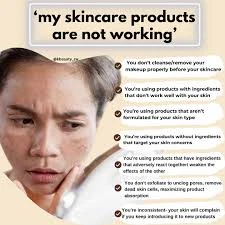Why skincare products don't work
Skincare products are often marketed as miracle solutions for glowing, clear skin. However, many people become frustrated when they don’t see results. There are several reasons why skincare products may not work as expected. Understanding these reasons can help you make better choices and improve your skincare routine.
1. Wrong Products for Your Skin Type
One of the most common reasons skincare doesn’t work is using products that are not suitable for your skin type. For example, using oily or heavy creams on acne-prone skin can clog pores and cause breakouts. Similarly, using strong acne products on dry or sensitive skin can lead to redness, irritation, and peeling. It's important to know your skin type—dry, oily, combination, or sensitive—and choose products formulated specifically for your needs.
2. Unrealistic Expectations
Many skincare products take time to show visible results. A common mistake is expecting overnight improvement. Ingredients like retinoids, vitamin C, or niacinamide may take several weeks (4–12 weeks) to show noticeable effects. If you switch products too quickly or give up too soon, you may never see the full benefits. Consistency and patience are key in skincare.
3. Poor Skincare Routine or Product Layering
Using products in the wrong order or not following a consistent routine can reduce their effectiveness. For instance, applying a serum after a thick moisturizer can prevent the serum from absorbing into the skin. The correct order is usually: cleanser → toner (optional) → treatment/serum → moisturizer → sunscreen (in the morning). Also, not cleansing properly can leave dirt and oil that block the effects of other products.
4. Not Using Sunscreen
Many people skip sunscreen, not realizing it can undo all the benefits of other skincare steps. Sun exposure can worsen pigmentation, cause early aging, and counteract ingredients like vitamin C and retinoids. Without sunscreen, your skin is constantly being damaged, and your skincare products won’t be able to keep up. Daily use of SPF 30 or higher is essential, even on cloudy days.
5. Using Too Many Products
Sometimes, less is more. Overloading your skin with multiple active ingredients can lead to irritation, redness, and breakouts. For example, combining strong exfoliants like AHAs or BHAs with retinol or vitamin C can overwhelm your skin barrier. A damaged barrier can make your skin more sensitive and prevent products from working properly. Stick to a simple routine and introduce new products gradually.
6. Underlying Health or Hormonal Issues
Sometimes, the problem is not the skincare but your internal health. Hormonal imbalances, stress, poor diet, and lack of sleep can all affect your skin. No product can fix breakouts caused by PCOS or dark circles from sleep deprivation. In such cases, skincare can help manage symptoms, but addressing the root cause is also important.
Conclusion
Skincare products may not work for many reasons, including mismatched formulas, unrealistic expectations, poor routines, or underlying health issues. To get the most out of your products, choose the right ones for your skin, apply them consistently and correctly, protect your skin with sunscreen, and pay attention to your overall health. Patience and simplicity often lead to better results than constantly chasing the latest trends.

Related Blog
What Causes Oily Skin and Can It Be Managed Naturally? Exploring Root Causes and Gentle Solutions
Aug 2, 2025 by Admin
General
What Are the Signs That You Have Sensitive Skin? Key Symptoms to Help You Identify This Delicate Skin Type
Aug 1, 2025 by Admin
General